Classic Commentaries and Studies on the Gospel of John Upgrade (29 vols.)
Digital Logos Edition
Overview
Ninety percent of the account in the Gospel of John is unique among the Gospels. The account of the disciple whom Jesus loved presents a developed and complex theology of Christ and Salvation that has kept commentators busy for centuries. The 29-volume Classic Commentaries and Studies on the Gospel of John Upgrade features even more of the best nineteenth- and twentieth-century commentaries and studies on the fourth Gospel. Among the authors of these classic volumes are Scottish Reformed theologian John Brown, Anglican priest M. F. Sadler, and American Congregationalist minister Lyman Abbott. Filled with more than 9,500 pages of commentary, criticism, exposition, and devotional literature, these volumes are valuable for their insights into both Johannine theology and the history of studies on John.
Logos Bible Software lets you utilize classic commentaries like never before. You’ll be able to read these texts alongside both modern and ancient studies on John, the Synoptic Gospels, and the whole Bible. Tools like the Timeline help you place authors into their historical context. Scripture and ancient-text citations link directly to English translations and original-language texts, and important terms link to dictionaries, encyclopedias, and a wealth of other resources in your digital library. The Topic Guide lets you perform powerful searches to instantly gather relevant biblical texts and resources. With Logos Bible Software, the most efficient and comprehensive research tools are in one place, so you get the most out of your study.

Key Features
- Twenty-nine classic studies on the Gospel of John
- A balance of criticism, commentary, exposition, and devotional literature
- Work from a variety of important nineteenth- and twentieth-century authors
Product Details
- Title: Classic Commentaries and Studies on the Gospel of John
- Volumes: 29
- Pages: 9,542
Individual Titles
- The Great High Priest within the Veil: Being an Exposition, Doctrinal, and Practical, of Chapter XVII of John’s Gospel by Thomas Alexander
- Christ, the Light of the World: Biblical Studies on the First Ten Chapters of St. John’s Gospel by Rudolph Besser
- An Exposition of Our Lord’s Intercessory Prayer: With a Discourse on the Relation of Our Lord's Intercession to the Conversion of the World by John Brown
- The Gospel according to St. John: With Notes Critical and Practical by M. F. Sadler
- The Last Scenes in the Life of Our Lord and Saviour: A Series of Practical Expositions on the Last Nine Chapter of the Gospel of St. John by D. T. K. Drummond
- An Exposition of the Gospel according to St. John, vol. 1 by John Fawcett
- An Exposition of the Gospel according to St. John, vol. 2 by John Fawcett
- An Exposition of the Gospel according to St. John, vol. 3 by John Fawcett
- The Holy of Holies: Sermons on Fourteenth, Fifteenth, and Sixteenth Chapters of the Gospel of John by Alexander Maclaren
- The Holy Gospel according to Saint John by John McIntyre
- Spiritual Studies in St. John’s Gospel, vol. 1 by Arthur Ritchie
- Spiritual Studies in St. John’s Gospel, vol. 2 by Arthur Ritchie
- Spiritual Studies in St. John’s Gospel, vol. 3 by Arthur Ritchie
- Spiritual Studies in St. John’s Gospel, vol. 4 by Arthur Ritchie
- Spiritual Studies in St. John’s Gospel, vol. 5 by Arthur Ritchie
- Spiritual Studies in St. John’s Gospel, vol. 6 by Arthur Ritchie
- Spiritual Studies in St. John’s Gospel, vol. 7 by Arthur Ritchie
- Studies in the Gospel according to St. John by J. Cynddylan Jones
- An Illustrated Commentary on the Gospel according to St. John: For Family Use and Reference, and for the Great Body of Christian Workers of All Denominations by Lyman Abbott
- The Gospel according to St. John: An Inquiry into Its Genesis and Historical Value by Hans Hinrich Wendt
- “Life” in St. John’s Gospel by J. Gurney Hoare
- The Criticism of the Fourth Gospel: Eight Lectures on the Morse Foundation by William Sanday
- The Soul-Winner’s Gospel by Gerrit Snyder
- The Gospel of John: A Popular Commentary upon a Critical Bsis, Especially Designed for Pastors and Sunday Schools by George W. Clark
- The Deity of Jesus Christ: According to the Gospel of John by Samuel W. Pratt
- Das Evangelium des Johannes by Theodor Zahn
- Erklärung des Evangeliums nach Johannes by August Bisping
- Das Evangelium Johannis by Julius Wellhausen
- Commentar über das Evangelium des Johannes by Friedrich Lücke
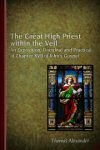
In The Great High Priest within the Veil, Thomas Alexander, a nineteenth-century Presbyterian minister, provides an exposition of chapter 13 through 17 of the Gospel of John—the Last Supper and Jesus’ discourse that followed. The substance of the text was originally delivered in several Sabbath lectures, though Alexander “altogether rewrote” them. They are a valuable resource for studying Jesus’ last teachings to his disciples before his arrest.
Thomas Alexander (1817–1872) studied at St. Andrew’s University and Free Church College in Edinburgh and was minister of Ranelegh Presbyterian chapel from 1851 until his death. He played a pivotal role in elevating Presbyterian churches in London.
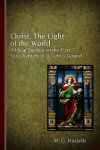
Rudolph Besser’s Christ, the Light of the World is a classic German commentary covering the first 10 chapters of the Gospel of John. Translated by M. G. Huxtable, this volume offers classic German Protestant studies on the prologue and the miracles of Jesus in the first half of John. Besser’s work is a substantial and accessible commentary on the Gospel of John, as well as a valuable resource for scholars of German Protestantism.
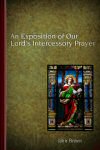
John Brown’s Exposition of Our Lord’s Intercessory Prayer provides classic Reformed commentary on the prayer Jesus’ offers up at the end of his final teaching for his disciples following the Last Supper. Through his exposition, Brown seeks to bring out the beauty and worth of this prayer, that is often overshadowed by the Lord’s Prayer. Brown’s work is a valuable resource for devotional and scholarly study.
John Brown (1784–1858) was a Scottish minister and theologian in the United Presbyterian Church of Scotland best known for his exegetical method of preaching. He was educated at the University of Glasgow (DD) and served as minster of several congregations in Scotland as well as professor of exegetical theology to the United Presbyterian Church in Edinburgh.
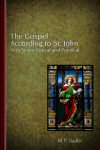
In this volume, M. F. Sadler provides a verse-by-verse critical commentary on the book of John. His exegesis focuses on practical explanation and detail. Sadler approaches the text as the divinely inspired word of God, looking for God’s intent in communicating the events and details of John to the reader.
M. F. Sadler was an Anglican priest and the rector of Honiton. He is also the author of critical commentaries on Corinthians, Romans, Matthew, Mark, and Acts.
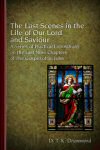
Addressed to his congregation at Trinity Chapel in Edinburgh, D. T. K. Drummond’s Last Scenes in the Life of Our Lord and Saviour offers a practical exposition of the Gospel of John from the Last Supper onward. Drummond’s practical insights for his parishioners remain valuable tools for devotional study today.
D. T. K. Drummond was a British minister and Bible scholar. He was minister of Trinity Chapel in Dean Bridge, Edinburgh for 10 years before resigning and became a minister of the Church of England.
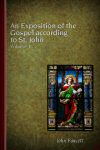
An Exposition of the Gospel according to St. John, vol. 1
- Author: John Fawcett
- Publisher: Knaresborough, J. D. Hannam
- Publication Date: 1856
- Pages: 299
This volume contains the first part of John Fawcett’s classic exposition of the Gospel of John. Fawcett works through a few verses at a time, offering practical and scholarly insight into the text. Volume 1 covers the first six chapters of John’s Gospel.
John Fawcett (1769–1851) was minister of St. Cuthbert’s Church in Carlisle, Northern England.
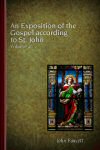
This volume contains the second part of John Fawcett’s classic exposition of The Gospel of John. Fawcett works through a few verses at a time, offering practical and scholarly insight into the text. Volume 2 covers the John seven through thirteen.
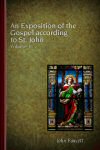
This volume contains the third and final part of John Fawcett’s classic exposition of The Gospel of John. Fawcett works through a few verses at a time, offering practical and scholarly insight into the text. Volume 3 covers chapter 14 to the end of John’s Gospel.
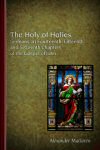
Alexander Maclaren’s The Holy of Holies offers a classic exposition of Jesus’ teachings following the Last Supper. Maclaren, ranked among the expert expositors of the nineteenth century, originally presented this material in a series of 34 sermons. This volume preserves Maclaren’s expert exposition and practical insight for twenty-first-century readers.
Alexander Maclaren (1826–1910) was a Baptist preacher in England. He was educated at Stepney College, London, where he studied Hebrew and Greek and learned the discipline of expository preaching. He presided over Portland Chapel in Southhampton for 12 years, Union Chapel in Manchester for 45 years and was twice elected as president of the Baptist Union. His ministerial career spanned nearly 65 years from 1842–1905. MacLaren’s passion for the pulpit ministry was only surpassed by his pursuit of a life hid with God in Christ. He was revered by all who heard him speak and has served as an exemplar of expository preaching for all who have come after him.
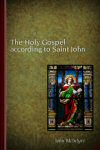
John McIntyre’s The Holy Gospel according to Saint John provides an accessible introduction to the Gospel of John. McIntyre introduces the author to the context of the Gospel, discussing authorship, its relation to the Synoptics, its historical context, and its style. He then divides John into three sections: prologue, Christ in life, and Christ in death and resurrection. This accessible commentary remains valuable both for devotional and scholarly study.
John McIntyre was professor of Scripture at St. Mary’s College, Oscott.
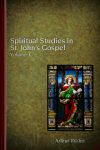
Volume 1 of Arthur Ritchie’s Spiritual Studies in St. John’s Gospel examines select passages from the first four chapters of the fourth Gospel. Confining its study to spiritual themes—as opposed to historical or linguistic questions—Richie’s study is useful for the edification of Christians who are trying to explore the role of spirituality in their everyday life.
Arthur Ritchie (1884–1914) was reverend at St. Ignatius of Antioch Episcopal Church, New York City.
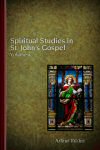
Spiritual Studies in St. John’s Gospel, vol. 2
- Author: Arthur Ritchie
- Publisher: General Books LLC
- Publication Date: 2012
- Pages: 230
Volume 2 of Arthur Ritchie’s Spiritual Studies in St. John’s Gospel examines select passages from chapters five and six of the fourth Gospel. Confining its study to spiritual themes—as opposed to historical or linguistic questions—Richie’s study is useful for the edification of Christians who are trying to explore the role of spirituality in their everyday life.
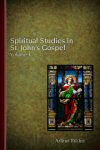
Volume 3 of Arthur Ritchie’s Spiritual Studies in St. John’s Gospel examines select passages from chapters seven, eight, and nine of the fourth Gospel. Confining its study to spiritual themes—as opposed to historical or linguistic questions—Richie’s study is useful for the edification of Christians who are trying to explore the role of spirituality in their everyday life.
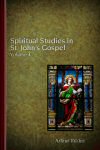
Volume 4 of Arthur Ritchie’s Spiritual Studies in St. John’s Gospel examines select passages from chapters 10, 11, and 12 of the fourth Gospel. Confining its study to spiritual themes—as opposed to historical or linguistic questions—Richie’s study is useful for the edification of Christians who are trying to explore the role of spirituality in their everyday life.
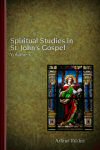
Volume 5 of Arthur Ritchie’s Spiritual Studies in St. John’s Gospel examines select passages from chapters 13, 14, and 15 of the fourth Gospel. Confining its study to spiritual themes—as opposed to historical or linguistic questions—Richie’s study is useful for the edification of Christians who are trying to explore the role of spirituality in their everyday life.
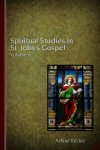
Volume 6 of Arthur Ritchie’s Spiritual Studies in St. John’s Gospel examines select passages from chapters 16 and 17 of the fourth Gospel. Confining its study to spiritual themes—as opposed to historical or linguistic questions—Richie’s study is useful for the edification of Christians who are trying to explore the role of spirituality in their everyday life.
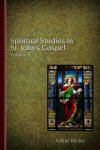
Volume 7 of Arthur Ritchie’s Spiritual Studies in St. John’s Gospel examines select passages from chapters 18 to 21 of the fourth Gospel. Confining its study to spiritual themes—as opposed to historical or linguistic questions—Richie’s study is useful for the edification of Christians who are trying to explore the role of spirituality in their everyday life.
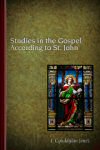
J. Cynddylan Jones’ volume on the Gospel of John features 16 sermons on texts throughout John. Jones covers topics in Christology and the miracles of Jesus in John. Jones focuses on demonstrating expository preaching for young preachers.
J. Cynddylan Jones (1840–1930) was a Welsh Congregational minister and theologian. He published several well-received commentaries on New Testament texts in both English and Welsh.
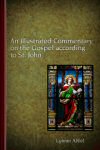
This charming volume from Lyman Abbott provides a practical commentary on the fourth Gospel. Based on the Greek text, but presented with the English translation, Abbott hopes “to give the results rather than the processes of scholarship” in his commentary. Abbott provides historical analysis and exegesis, archaeological background, and helpful illustrations and maps. His focus is on illuminating the meaning of the Gospel for families and congregations.
Lyman Abbott is the author of The Acts of the Apostles with Notes, Comments, Maps, and Illustrations, Dictionary of Religious Knowledge, An Illustrated Commentary on the Gospels: Mark and Luke, and Jesus of Nazareth.
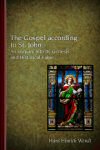
This scholarly text from German Protestant professor Hans Hinrich Wendt examines the origin and historicity of the fourth Gospel. Wendt hypothesizes the Gospel of John is composed of two sources—an older written account, and the later additions of a redactor. Wendt examines the critical problems presented by John’s Gospel, outlines its structure, examines it in relation to the Synoptic Gospels, and offers his conclusions on John’s authorship and reliability.
Hans Hinrich Wendt (1853–1928) was a German Protestant theologian. He studied theology at Leipzig, Göttingen, and Tübingen. He was professor ordinarius of systematic theology at Heidelberg and Jena.
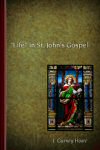
This fascinating study from J. Gurney Hoare examines the use of the word “life” in the fourth Gospel. Hoare writes in a lively, accessible voice making his study ideal for both devotional and scholarly study. He begins by listing every instance of the word “life” in John and goes on to discuss 10 different characteristics of life in the text.
J. Gurney Hoare was vicar of Aylsham, Norfolk, and canon of Norwich.

This volume contains eight critical lectures from professor William Sanday at Union Seminary, New York. In them Sanday surveys Johannine criticism on topics such as authorship, its relation to the Synoptic Gospels, Christology, and historicity. Sanday’s work is an excellent introductory and overview to the critical study of John.
William Sanday (1843–1920) was Dean Ireland’s Professor of Exegesis of Holy Scripture at Oxford between 1883 and 1895, as well as Lady Margaret Professor of Divinity and canon of Christ Church between 1895 and 1919. His works include The Authorship and Historical Character of the Fourth Gospel, The Gospels in the Second Century, Outlines of the Life of Christ, and the Bampton Lectures for 1893.
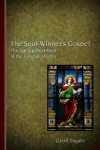
Gerrit Snyder’s The Soul-Winner’s Gospel focuses on the doctrines of salvation as they are presented in John. Snyder explains what makes the Gospel of John so particularly fit for evangelistic work and provides examples of the book applied for evangelistic purposes. Snyder’s work is a valuable resources for studying evangelism and missions, as well as for personal devotion.
Gerrit Snyder (1857–1941) was pastor of First Presbyterian Church in Pittsburgh, Kansas. He studied at Lenox College, Iowa and McCormick Theological Seminary, Chicago.
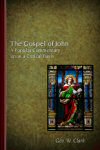
George W. Clark’s commentary on John offers practical, accessible commentary, grounded in rigorous study. Clark aims for a commentary “suited to the wants of Sunday-schools and families, and helpful also to many pastors and preachers.” Clark also focuses on incorporating the harmony and chronology of the Synoptic Gospels.
George W. Clark was the author of The Harp of Freedom, A New Harmony of the Four Gospels, The Mighty Worker: Lessons in Mark and other titles, and Notes on the Acts of the Apostles.
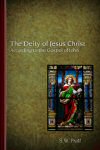
Samuel W. Pratt’s The Deity of Jesus Christ focuses on the complex Christology developed in the fourth Gospel. Since “one knows himself best who knows God best,” what John says about Jesus as God is of paramount importance to Christians. Pratt focuses on the evangelistic question, “What think ye of Christ?” and suggests how John answers this question and forces readers to make a decision.
Samuel W. Pratt (1838–1910) was an American preacher and author who wrote several works, including A Summer at Peace Cottage and The Deity of Jesus Christ according to the Gospel of John.
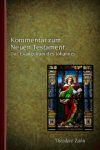
This German-language volume contains Theodor Zahn’s Das Evangelium des Johannes. Zahn offers a traditional perspective on the fourth Gospel, offering a section by section exposition of the entire text.
Theodor Zahn (1838–1933) was professor of theology at Göttingen, Kiel, Erlangen, and Leipzig. He was a leading voice for conservative biblical scholarship, and was the preeminent scholar of the New Testament canon in nineteenth-century Germany. He advocated the theological perspective known as “Heilsgeschichte” and was nominated for the Nobel Prize in Literature in 1902, 1904, and 1908.
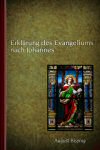
This German-language volume contains German theologian August Bisping’s Erklärung des Evangeliums nach Johannes. Bisping provides an exposition of all 21 chapters of the fourth Gospel.
August Bisping (1811–1884) was a German theologian and ordinary professor of exegesis at Münster.
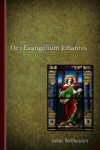
This German-language volume contains German Higher Criticism representative Julius Wellhausen’s Das Evangelium Johannis. This critical text precisely examines the literary structure and linguistic character of John.
Julius Wellhausen (1844–1918) was privatdozent of Old Testament at Göttingen, professor of philology at Halle, and professor ordinarius at Greifswald and Marburg. He is widely known for his controversial theories on the origins of the Pentateuch, now called the “documentary hypothesis.” In 1882, struggling with his conscience, he resigned his professorship stating, “I became a theologian because the scientific treatment of the Bible interested me; only gradually did I come to understand that a professor of theology also has the practical task of preparing the students for service in the Protestant Church, and that I am not adequate to this . . . I make my hearers unfit for their office. Since then my theological professorship has been weighing heavily on my conscience.”
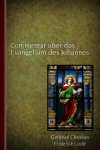
This German-language volume contains Friedrich Lücke’s Commentar über das Evangelium des Johannes. Lücke discusses the authorship, audience, scope, and structure of the fourth Gospel. His thorough commentary is valuable as a scholarly and devotional work.
Friedrich Lücke (1791–1855) was educated at the University of Halle, the University of Göttingen, and at the Friedrich Wilhelm University in Berlin. Lücke went on to become professor of theology at the University of Bonn.
Reviews
0 ratings

Larry Craig
10/3/2019
This has been in CP for almost 6 years. I have made a number of suggestions on getting books out of CP. I can make them again if anyone wants to hear them. But please do something, whether better publicity or (read my suggestions).
Stephen Steele
10/23/2017
Please add 'The Inner Sanctuary' by Charles Ross, which Banner of Truth have republished a number of times: https://banneroftruth.org/uk/store/sermons-and-expositions/the-inner-sanctuary/
Jeffrey D Nickel
7/18/2017
William Weinrich's commentary on the Gospel of John would be an excellent addition to this collection.

Christopher Engelsma
3/21/2014
M. F. Sadler provides a verse-by-verse critical commentary on the book of Acts….? Shouldn't that be John?
Prayson Daniel
3/21/2014
I love the gospel according to John. Having a classic commentaries on John would be a dream come true moment.